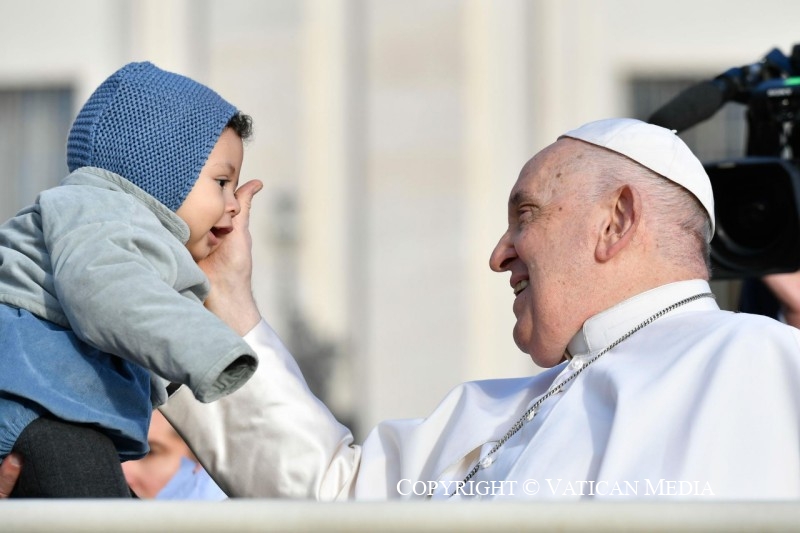Pope on Ukraine: 'Has everything possible been done to stop the war?'
One year after the start of the war, Francis' warning at the general audience: 'There can be no victory over rubble'. On the first day of Lent the invitation to the faithful: 'Let us intensify during this period prayer, meditation on the word of God and service to our brothers and sisters'. Today the rite of ashes in Santa Sabina.
Vatican City (AsiaNews) - "Will the Lord forgive so many crimes and so much violence? He is the God of peace, let us remain close to the martyred Ukrainian people who continue to suffer and let us ask ourselves: has everything possible been done to stop the war?".
On the first day of Lent, which falls a few hours after the "sad anniversary" of the start of the "absurd, sad and cruel" war in Ukraine, Pope Francis used these words to once again raise his cry for arms to be silenced.
He did so at the end of the general audience in the Paul VI Hall, renewing his appeal to "those who have authority over nations, so that they may commit themselves concretely, for an end to the conflict, to reach a ceasefire and to begin peace negotiations". That "built on rubble," he added, "will never be a true victory".
"Today begins Lent," he then recalled, "a privileged time of conversion and penance for our spirit. I would like to ask all of you to intensify prayer, meditation on God's word and service to your brothers and sisters during this period". This afternoon the pope himself - as is his custom - will preside over the rite of ashes in the basilica of Santa Sabina on the Aventine Hill in Rome.
Returning to the general audience, in his weekly catechesis the pontiff continued the cycle of reflections on apostolic zeal in evangelisation. The Risen One," the pope observed, "exhorts us to go "not to indoctrinate or make proselytes, but to make disciples, that is, to give everyone the possibility to come into contact with Jesus, to know and love him".
The same invitation to baptise 'before indicating a liturgical action, expresses a vital action: to immerse one's life in the Father, in the Son, in the Holy Spirit; to experience every day the joy of the presence of God who is close to us as Father, as Brother, as Spirit acting in us, in our very spirit'.
It is the Holy Spirit, in fact, "the engine of evangelisation". And to explain how he acts, Francis referred to the account in the Acts of the Apostles on the first Council of Jerusalem, the one of the decision on how to deal with the pagans who came to the faith without belonging to the Jewish people. An issue on which even in the first community there were different opinions. 'A good compromise could have been sought,' the pontiff observed, 'between tradition and innovation: some rules are observed, others are left out.
Yet the Apostles did not follow this human wisdom, but adapted to the work of the Spirit, who had anticipated them, descending on the pagans as on them'. It was a choice in obedience to the "principle of proclamation: everything in the Church must be conformed to the requirements of the proclamation of the Gospel; not to the opinions of conservatives or progressives, but to the fact that Jesus reaches people's lives.
Therefore, every choice, use, structure and tradition are to be evaluated to the extent that they favour the proclamation of Christ'. "The Gospel," added Abraham, "is not an idea or an ideology, but a proclamation that changes the heart. If you take refuge in an idea, in an ideology whether right or left or centre, you are making the Gospel a political party, an ideology, a club of people'.
The Holy Spirit is therefore "the light that orients the Church: it makes clarity, helps to distinguish, to discern. For this reason," the Pope added, "we must invoke him often; let us do so also today, at the beginning of Lent. Because, as Church, we can have well-defined times and spaces, well-organised communities, institutes and movements, but without the Spirit, everything remains soulless.
The Church, if it does not pray and invoke the Spirit, closes in on itself, in sterile and exhausting debates, in wearisome polarisations, while the flame of the mission is extinguished. The Spirit, on the other hand, makes us go out, urges us to proclaim the faith to confirm ourselves in the faith, to go on mission to find who we are'.
25/02/2022 16:12
26/02/2020 19:05
02/03/2022 17:26







.png)










